- Home
- Brian Hodge
Whom the Gods Would Destroy Page 6
Whom the Gods Would Destroy Read online
Page 6
On the plus side, I could see it working out great if your primary interest was stargazing.
This part I was doing alone. Perhaps it was unfair, but Ashleigh was staying behind, in a musty-smelling motel a few miles up the road. I wanted my father feeling free to talk, and didn’t know if I’d want her to hear what he had to say.
Ashleigh took it otherwise, asking, “Which of us are you more ashamed of?”
“I haven’t seen him since I was two. It’s not like a normal visit,” I said. “If things go all right, we can come back someday.”
Saying whatever would work in the moment? Cameron would’ve approved.
It took some asking around to get pointed in the right direction—I’d brought a few six-packs and packs of cigarettes to pave the way—during which I discovered that people didn’t know my father so much as Andrew Phipps as they knew him as Catfish Andy. Apparently nicknames were big here. He liked to fish—I remembered that from his letters—and not far to the east flowed an aqueduct where catfish were plentiful. I could see this being a favorable combination in a barter economy.
In the late afternoon, under the shade of a colorful canvas awning held up by poles, he met me outside his trailer, a dinosaur that had been driven here at some point in eons past, but would never leave under its own power. It had no tires, settled into the hardpan on its rims, and the engine was gone, the hood propped up to reveal a makeshift storage bin.
He was what I remembered from the photos, only older, more weathered, the product of a decade in the desert moving from one shady spot to another, but having no reason to hurry. The sun had faded his clothes to the color of the earth around him and melted every ounce of fat from his bones. He had an unruly salt-and-pepper beard, and brown scalp peeking through his hair, and I had to remind myself that he was not yet even fifty.
When he looked at me, I could see the mileage of everything he still had reasons to regret, all at once. I felt no connection to him, but no animosity, either. Whatever resentment I’d harbored had dissipated. He was like a character in a book I’d read as a boy, then mostly forgotten, because I didn’t read those kinds of books anymore.
Behind him, I saw a round-faced woman peering through the window with a look of wariness, something fierce about her between her lines and dreadlocks. It made me glad for him, that there was somebody who felt protective of him. There had to be good in him for that, and he looked to need it anyway.
His smile was genuine, but he had to force it through a veil of remorse, and after a moment the eye contact grew too much for him, and he gazed down at the dirt. Then:
“I can think of only a couple of reasons you might have for tracking me down,” he said. “And since you’ve probably already figured out I’m not much good for money, that just leaves one.”
* * *
“I’ve met a lot of sick people along the way, and sometimes I haven’t been so well myself,” my father said. “Not sick in the body. Not even sick in the head. Sick in the soul, is I guess how to put it. The roads are littered with people like that. But your mother, she was the worst of them I ever met.” He looked at me, checking in. “Is it going to bother you to hear me say things like that about your mom?”
I told him that I’d stopped thinking of her as Mom a long time ago. He could say whatever he had to say.
He nodded. “Of course, I didn’t see that about her at first. Or I did, except all I saw was what was on the surface, and that’s what drew me in. I didn’t see what was really behind it until later.”
We were sitting in lawn chairs on the roof of the camper he shared with the woman I’d seen in the window. Linda, her name was, a total Earth-mother type. My father claimed he would’ve married her years ago if not for the fact that he and my mother had never actually divorced. I wondered if he still would, with the news that she was dead. I couldn’t see it. He and Linda lived in a community that called itself the last free place in America. What was the worth of a piece of paper from my world? If they felt like a ceremony, there had to be a shaman or renegade priestess around here somewhere, who would perform it for a catfish or two. Maybe they’d already done that much.
Night had come, and he’d brought up a six-pack of cheap beer. I got the feeling that he did this a lot: climbed the ladder up the back of the camper and sat beneath the canopy of stars and contemplated every strange turn in life that had led him here. For one thing, the lawn chairs were already up here.
And I’d been right. It was a good place to watch the show overhead. This wasn’t the darkest place I’d ever been—light bled in from the other homes, from fires and lanterns and battery-powered lamps, while a pale smudge tainted the sky in the west, in the direction of the ecological catastrophe known as the Salton Sea. But the sky was deep enough to make me feel at home, even though I was very far from any home I’d ever known.
“You couldn’t call it a wildness about her. That wasn’t it, exactly. She seemed like she might be up for just about anything. Except there was a part of her that came off like she was really serious about it. There was more to it than just having fun. And the fact of her being a nun once, that just sealed the deal for me. I figured she must feel like she had a lot of making up for lost time to do, if you get what I mean.” He winced with another sheepish look at me. “Are you sure it’s not going to bother you hearing me talk about her that way?”
“Entirely sure. By now, all she was to me was a birth canal.”
That seemed to shock him, and I’d meant it to. Plus, it may have hit deeper. As a father, the most he’d provided could have been sent to her in a test tube.
“Anyway, I suppose she fit the bill for what I was looking for at the time.”
“And it didn’t bother you that she already had a toddler?” I asked. “That doesn’t seem like it would’ve been part of the package you had in mind.”
“This is going to sound terrible. Well, because it is. There was a boss I had when I was seventeen, eighteen, working in a warehouse. He had this pretty wife, and hey, good for him, but I never could put the two of them together. She could’ve done better, you know? And she had this pretty little girl, wasn’t his. On Christmas Eve, when we were winding down, he got a few drinks in him and started barking out life advice. Here’s what he told me. He said, ‘Andy, if you want to be sure to keep a woman, look for one that’s already got a kid. She’ll be grateful, and she won’t ever leave you.’” He turned sheepish again. “I guess I was still remembering that a few years later.”
“Very noble,” I said. “Except you’re the one who left her.” Us, I almost said, but there was never any us. There was me and there was them.
“Same as you did, as soon as you could.”
He started in with the apologies, finally, but he wasn’t very good at it, as if it was something he’d always wanted to do but had never planned for, never rehearsed, so he had no idea what to say. He came off like a man whirling in the aisle of a store after forgetting a birthday, randomly plucking things off the shelves. Would my boy like this? Or this? This? I stopped him before it could get any more embarrassing.
“Understanding,” I said. “That’s the greatest thing you could give me right now.”
He nodded. “Just remember. You asked for this. When you learn something like this, you don’t get to go back and unlearn it.” He took a long, gurgling pull at his can, then notched it between his thighs as he stared at the sky. “You’ve heard what nuns call themselves, I’m sure. Brides of Christ. You never think of a jilted bride in that context, but that’s how Helen came to see herself. I’ve only got her word for it, but to hear her tell it, she was pretty typical of the kind to decide that the Church is going to be the life for her. Rather go to Mass than go to school, rather light a candle than spark up a joint. Always on the lookout for a leper to hug. Dreams telling her what to do. Thinks God has it all planned out for her, and she’s got his word on it, because she thinks he talks to her. That was Helen. Even then, though, it didn’t sound like it was
totally healthy on her part. There was this saint she idolized. Catherine of Siena…ever hear of her?”
I hadn’t. None of this had ever been in my sphere of interests.
“Hear about her now, and she just sounds like an anorexic, and whatever body issues she had, she made them her way of getting closer to God. At least that’s Linda’s take on it. Your mother had some of that in her herself. The Church, that was her life for six, seven years, I think it was.
“But some people, when they fall hard in love, they fall hard out of it, too. It’s not a clean break. There’s a lot of hate that comes out of it. I never could get to the bottom of what turned her around, but she got to feeling she was playing for the losing team. It all got to be just empty ritual for her. She couldn’t see any evidence of God’s favor on the world, or even much inside the Church, for that matter, that it was rotting from the inside, so she decided she wanted to play for the winning team for a change.”
“Winning team,” I said. “What does that mean?”
I knew perfectly well what it meant. It just sounded so ludicrous. My mother, the devil’s concubine. It sounded like the actions of a rebellious fifteen-year-old looking for something heavier than purple hair to shock her parents. Except she would’ve been, what, twenty-five at the time?
“Nothing to do with good, I’ll tell you that much,” he said. “She must’ve been on a real tear when she first came out of the convent. She, uh…” He was heading back into the territory that made him squirm about saying it aloud, but he was done asking permission. “She had this thing about defiling herself. I once heard a woman joke about how she’d given her body to men she wouldn’t trust to loan her car to. That was about the same story for Helen, only not as much to joke about. It wasn’t just a good time that would get out of hand. It was a mission. Anyway…that was around the time I took up with her.”
I had come from these people. You want to feel that you came out of something better than that. Better than a campaign of degradation.
“Did you love her at all?”
“I suppose I had to, didn’t I?” He hit on a glimmer of some memory that left him conflicted over how he should feel. “She had this way of making you think you were going to see something or feel something you never had before. And there were times she made good on it.”
“Did she ever talk about Cameron’s father, who he was?”
“One bit of fatherly advice, can I squeeze in that much?” he said. “It doesn’t matter how open a woman says she wants you to be with each other, she’s still going to hang on to her share of secrets. And that was one of hers.”
“He didn’t ever visit Cameron? Or she didn’t go after him for child support? None of that?”
He shook his head. “Said she’d gotten everything she wanted from him.”
“Did she even know who his father was? It sounds like she…”
“Got around? That may be, but she still seemed to know exactly who it was. She didn’t have any bad memories or hard feelings about it, either. Just the opposite. She’d get this self-satisfied smirk about it like she was the first woman to get knocked-up in a hundred years.” He gave a derisive grunt. “If you want the truth, half the time I thought she’d just cooked up some bullshit story in her head to make up for the fact that, however it happened, the experience was pretty seedy. And it had to be, the way she was living there for a time. I don’t care how wicked you think you are, if you get pregnant, you’re going to want to hang on to something decent about the way it happened.”
Or maybe my father was giving her too much credit. Maybe she’d enjoyed it just the way it had happened, however sordid. It had obviously meant far more to her than their experience of creating me, and that had to wound him.
“The most I’d ever get out of her about it was that it happened on a rooftop, under the stars,” he said. “I guess that was supposed to make it sound more romantic that way, more than I was. Except she was never much the romantic type.”
Again, the stars. It was as if she was reaching out from the past, from a state beyond death, to poison the thing I loved. Telling me that this passion I’d always cherished as an escape from her was, in fact, something I’d inherited from her.
“There’s something that doesn’t quite match up for me,” I said. “I don’t ever remember her being the way you said she was, after she’d renounced her vows. Like some silly cartoon witch. I don’t remember anything like that.”
“That was just a phase for her. She was just acting out then. She was already past it by the time I left. By then she was really getting serious. And it was worse than the other, way worse.”
He fell still for a while, and I realized that here we were, finally getting to the things that were capable of sending a man—a weak man, at least—on the run, into a lifetime of hiding from a lover whose strangeness had never let him go.
“The way she had it figured at first, see, was just what she’d had shoveled into her head for years. You’ve got good on one side and evil on the other, and you’ve got your figureheads there, each trying to call you over. Angel on one shoulder, a devil on the other, whispering in your ears…kind of quaint, really. Back then, she’d just scooted on over to the other side of the field. But she grew out of that.
“It’s all hostile to us—that’s the conclusion she came to. It’s all a much more terrible place than any system of rewards and punishments could make it. The world around us, and everything out there…” He gestured to the sky. “There’s no good in any of it. No evil, either. There’s no balance, no side to take. There’s no choice, other than to recognize that we’re just these soft little worms squirming around on a rock. That’s how she came to see it.”
I shrugged, severely unimpressed. “She and every other atheist I’ve ever met, if you ask them to lay it out when they’re having a bad day.”
“That’s not where it stopped. She wasn’t an atheist, exactly, and for sure she didn’t turn into a nihilist. She still had this need to believe. That’s a hard thing to kill off in most people. It’s gotta go somewhere.”
The same way it was with addicts, I supposed. If they’re fortunate enough to beat the addiction that’s killing them, they replace it with another that annoys the shit out of everyone around them. Trade the bottle for religion at its most rigid, the food for a fidgety compulsion to exercise.
“So where did it go?”
He pointed to the sky. “Out there.”
I feared I knew what he meant, without him having to explain. In some other family, his gesture would’ve meant the crazy aunt waiting for the UFO to pick her up. But not ours.
No, in our family it meant the forces of chaos and hostility that transcended time and space, and informed the random lottery of extinction events. It meant that she had worshipped a collective cosmic intelligence that permeated the collisions of electrons and galaxies, an intelligence before whom we were still bone-bashing primates. That was her ultimate god. She’d personified it, the way believers do, or maybe she’d merely sensed its titanic currents and sought to ride them, the same way surfers can develop their own religious zeal for the ocean.
And now, what—it had noticed her back? She’d taken it inside herself? Let it manifest through her?
“What made you leave?” I asked. “Something set you running.”
“She, uh…” He looked down, scowling into the past. “She wanted me to do this thing with her. Some sort of kinky role-play is what it sounded like to me, but it seemed like an awful lot of trouble, too. She wanted us to head way out in the sticks—it was when we were living in Nebraska, so there was plenty of sticks to head out into—and she wanted to tie me to a tree. I just thought it was Helen being Helen again, her old self, making something blasphemous out of it. But like I said, it sounded like a lot of trouble to go to when we had trees of our own right out in the backyard. And I wasn’t much for patience then. I didn’t do it.
“Then about a week later it came out in the news that some countr
y kids buzzing around on three-wheelers found this guy tied to a tree. Dead for days. He’d been burnt up while he was on there.”
It became a vertiginous roaring in my head, the way this latched together with what I’ve always regarded as my first memory.
“When the news broke, and I looked her in the eye, and saw that she knew that I knew…it put the fear in me. It was like she was daring me to say something, to anybody. I didn’t have any idea she was capable of something like that.”
“Was she alone in this?” I asked. “Or were there others? Did you ever hear her mention anything called the Fifth Way?” I waited. Nothing. “How about something called the Starry Road?”
Silence, still, but the quality of it had changed entirely. It was a silence rooted in fear and memories bad enough to seize the tongue.
“Where did you hear about that?” he finally asked.
“It just came up, something to do with Cameron.”
“Then you keep away from him. Brothers or not, you keep a lot of distance between him and you.”
I told my father that wasn’t going to be a problem. Then, “What are they all about?”
He leaned back in his chair, slumping now, as if everything I’d asked about had become a weight on his head, pushing him down in the mire of a past he would never completely escape.
“It’s a funny thing, sometimes,” he said. “You get so fucked up, that once you sleep it off and get your head on straight again, you think there’s no way you could’ve really heard things or seen things the way you thought you did. But then it keeps on happening.”

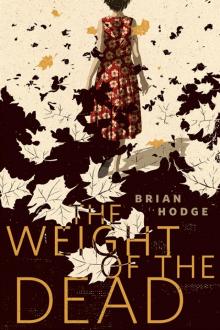 The Weight of the Dead
The Weight of the Dead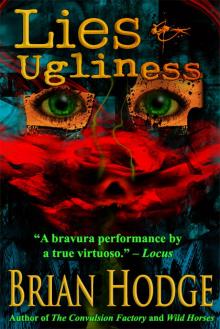 Lies & Ugliness
Lies & Ugliness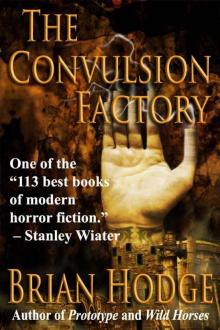 The Convulsion Factory
The Convulsion Factory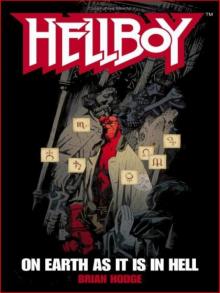 Hellboy: On Earth as It Is in Hell
Hellboy: On Earth as It Is in Hell Whom the Gods Would Destroy
Whom the Gods Would Destroy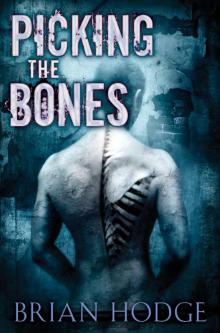 Picking the Bones
Picking the Bones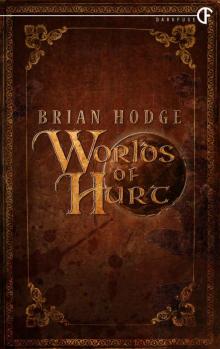 Worlds of Hurt
Worlds of Hurt Oasis
Oasis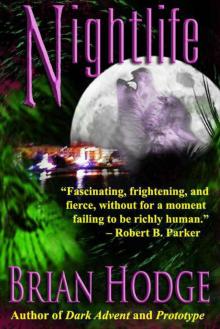 Nightlife
Nightlife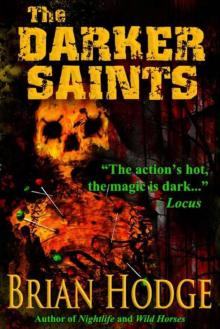 The Darker Saints
The Darker Saints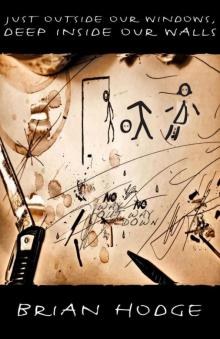 Just Outside Our Windows, Deep Inside Our Walls
Just Outside Our Windows, Deep Inside Our Walls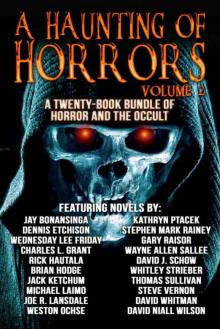 A Haunting of Horrors, Volume 2: A Twenty-Book eBook Bundle of Horror and the Occult
A Haunting of Horrors, Volume 2: A Twenty-Book eBook Bundle of Horror and the Occult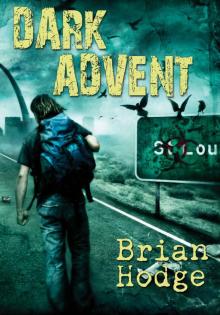 Dark Advent
Dark Advent Mad Dogs
Mad Dogs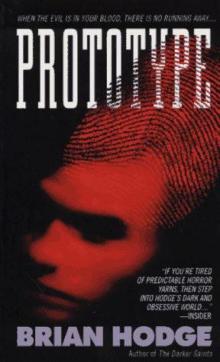 Prototype
Prototype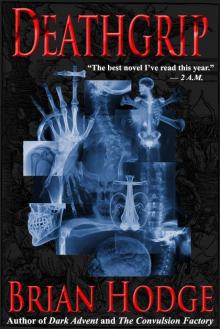 Deathgrip
Deathgrip Falling Idols
Falling Idols